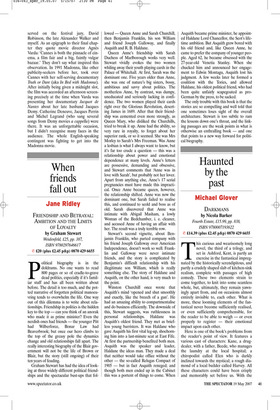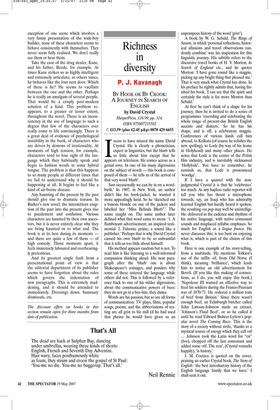Haunted by the past
Michael Glover
DARKMANS by Nicola Barker Fourth Estate, £15.99, pp. 838, ISBN 9780007193622 ✆ £14.39 (plus £2.45 p&p) 0870 429 6655 This curious and wearisomely long novel, the third of a trilogy, and set in Ashford, Kent, is partly an exercise in the fantastical impregnated by the historically serendipitous, and partly a crudely shaped slab of kitchen-sink realism, complete with passages of high comedy. These two elements strain to come together, to knit into some seamless whole, but, ultimately, they remain yawningly apart from, and on occasions almost entirely invisible to, each other. What is more, these looming elements of the fantastical never become sufficiently realised, or even sufficiently comprehensible, for the reader to be able to weigh — or even properly to register — their emotional impact upon each other.
Here is one of the book’s problems from the reader’s point of view. It features a various cast of characters: Kane, a drugdealer, with a father, Beede, who manages the laundry at the local hospital; a chiropodist called Elen who is darkly inclined towards the mystical; a rough diamond of a local builder called Harvey. All these characters could have been crisply and memorably set before us. With the exception of one scene which involves a very funny presentation of the wide-boy builder, none of these characters seems to behave consistently with themselves. They never seem fully realised. We don’t really see them or hear them.
Take the case of the drug dealer, Kane, and his father, Beede, for example. At times Kane strikes us as highly intelligent and extremely articulate; at others times, he behaves like the lout next door. Which of these is he? He seems to vacillate between the one and the other. Perhaps he is really an amalgam of several people. That would be a crisply post-modern solution of a kind. This problem reappears, to a greater or lesser extent, throughout the novel. There is an inconsistency in the use of language to such a degree that few of the characters ever really come to life convincingly. There is a great deal of evidence of psychological instability in the book, of characters who are driven by demons of irrationality. At moments of high tension, for example, characters tend to lose sight of the language which they habitually speak and begin to fashion words in some hybrid tongue. The problem is that this happens to so many people at different times that we fail to understand why it should be happening at all. It begins to feel like a kind of air-borne disease.
Any haunting of the present by the past should give rise to dramatic tension. In Barker’s new novel, the intermittent eruption of the past into the present gives rise to puzzlement and confusion. Various characters are haunted by their own ancestors, but it is never entirely clear why they are being haunted or to what end. The book is at its best during its moments and there are quite a few of them — of high comedy. Those moments apart, it feels immensely laboured and overbearingly pretentious.
And its greatest single fault from a presentational point of view is that the editorial department of its publisher seems to have forgotten about the rules which govern the indentation of new paragraphs. This is extremely maddening, and it should be attended to immediately. Dressings down. Summary dismissals, etc.











































































 Previous page
Previous page